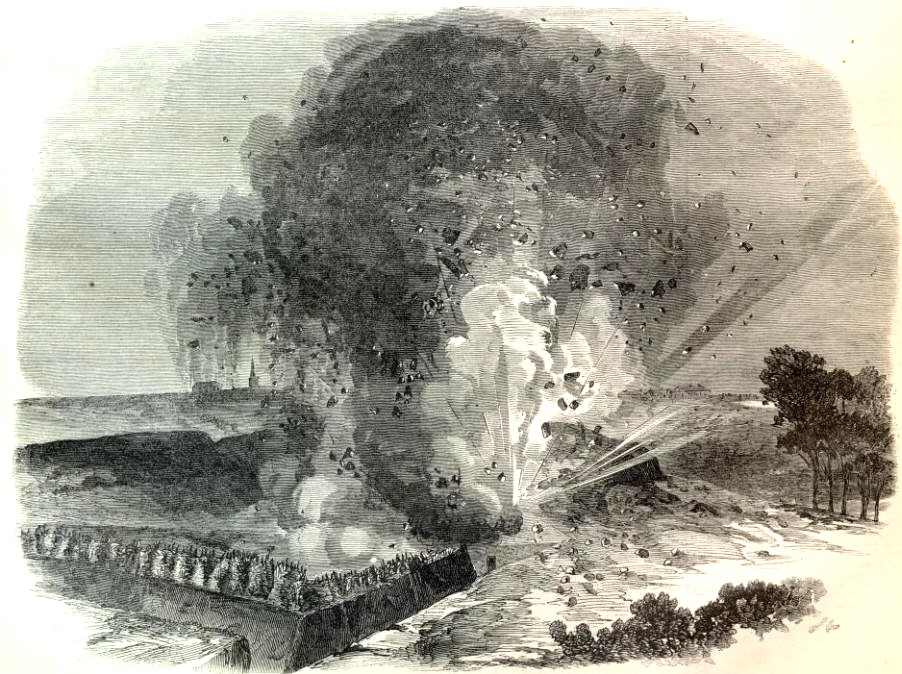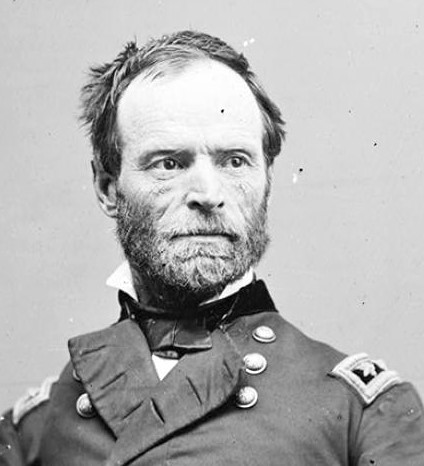Civil War: May and June 1863, to fight or flee

By Sandy Vasko
It is May of 1863; we continue our look at Will County in the Civil War. McAllister’s Battery from Plainfield, was in Mississippi engaged in small battles here and there during the first few days in May. Their importance in the upcoming battle to take Vicksburg was exemplified by the visit from General Sherman himself on May 9th.

Gen. William Tecumseh Sherman, who visited the 20th in May to thank them for their help at Shiloh, boosting their morale before the battle of Vicksburg.
From Woodruff’s book, Will County in the Civil War, we read: “Gen. Sherman then complimented the men for their services at Shiloh, when the battery went to his assistance. He told the boys that, ‘if he could ever do anything for them, he would do it. That if any man in McAllister’s Battery ever wanted a blanket to let him know it, and if he had but one, he would give him half.’ When he had got through, the boys gave him three hearty cheers.”
On the 12th the Battery was engaged in the Battle of Raymond. Although they did not know it, other Will County boys in the 20th were also fighting the same battle. Both of these units went on to fight the true Battle of Vicksburg.
In Woodruff’s book the battle is described as it was viewed by the 20th: “It would be impossible to convey an adequate idea of the harassing, exhausting nature of the service which was rendered by the 20th, in common with all parts of the investing army. To lie day and night in the trenches, in the heat of a southern summer, under the fire of the rebel forts, and with two, 10-inch guns (84-pounders), four 24-pounders (McAllister’s battery), and eight 10-pound guns, all the while being fired within twenty rods, was, to say the least, disagreeable. This was the kind of berth the boys of the 20th had got into.
“One day the rebels opened on the 20th, with a new battery of 10-pound guns, with which they kept things lively for a while, until McAllister’s 24-pound guns got the range of it and soon silenced it. An officer, with his field glass, saw the rebels carry back fifteen dead men from the battery.
“It was while this mortar was doing its work that R. W. Waterman, of Wilmington, made the boys a visit, and wanting to see as much as he could, went to the front to see the big guns. While being shown around with Lieut. Branch, one of the shells came over and buried itself in the ground within about 20 feet of them.
“Branch, being used to the thing, dropped to the ground at once, and told Waterman to do so; but he was so paralyzed with surprise that he forgot to drop. Happily, the shell had buried itself deep in the ground before it exploded, which gave an upward direction to fragments, and they were not hit. On being asked why he did not drop, Waterman said he was so busy praying that he forgot it.”
The rebels held out for 40 days, and during that whole time they, and the citizens of Vicksburg, were bombarded day and night. During this siege there was time for tricks and strategies. We read in Woodruff the following description from the point of view of McAllister’s Battery:
“During the siege the boys used to amuse themselves by plugging up the pipe holes, through which the enemy used to fire on our men whenever exposed. Many a brave boy had fallen before their deadly aim from these loopholes.
“The boys got so perfect in their gunnery, that they seldom failed to plug up the holes as fast as they made their appearance. The rebs then tried the trick of raising their hats on a stick, and drawing the fire of our men, and then taking their chance to shoot our men. It took a practiced eye to tell whether the hat held a stick or a head. So, our boys, having soon learned the trick, would fire a blank from one gun, and when the hat appeared the second time, let fly a shot or shell from the other gun. All these, and many other devices and tricks, and counter tricks were played during the siege.
“While this was going on, the sappers and miners were burrowing underground, like moles, preparing a mine to blow up Fort Hill, with the expectation that by this means they could force an entrance into the city.”
Lieut. Emmit Hill from Plainfield was a member of McAllister’s Battery. Woodruff tells his story: “Lieut. Hill had been a member of the battery when it used to play war in Plainfield, and when the war broke out was attending a commercial college in the city of New York. Capt. McAllister sent him, in a playful manner, a summons to appear and take his place in the battery. Lieut. Hill obeyed the summons, and served in the three months organization, and afterwards in the three years’ service.”
On June 17th Lieut. Hill, and a group of men under him, was ordered to an exposed position to act as gunner. He was at it an hour before anyone was hit. Woodruff tells us: “Lieut. Hill was himself hit by a musket ball, which entered his head a half inch back of, and a fourth inch below his right eye, passing out one half inch in front of his left ear. He was immediately taken to a hospital.
“When Lieut. Hill was brought to the hospital, the attending surgeons said that the man must die; could not possibly recover, and declined to do anything for him, as being of no use. A brother of his from Bolton’s battery came over to see him, and he was not satisfied to let the matter go so. He went to see General Logan about it, who, sent over his own surgeon, who dressed the wounds, and his brother and a man from battery D was detailed to take care of him. He recovered (with the loss of an eye) to the great surprise, and perhaps the disgust of the surgeons.”
The siege of Vicksburg was to end on July 4th, 1863 when Pemberton finally surrendered to Grant, and the Mississippi River became the possession of the Union.
Are you a Civil War buff who would like to get into the action? Will County Regiment, 100th Infantry, is seeking re-enactors. See ad on Page 5.
